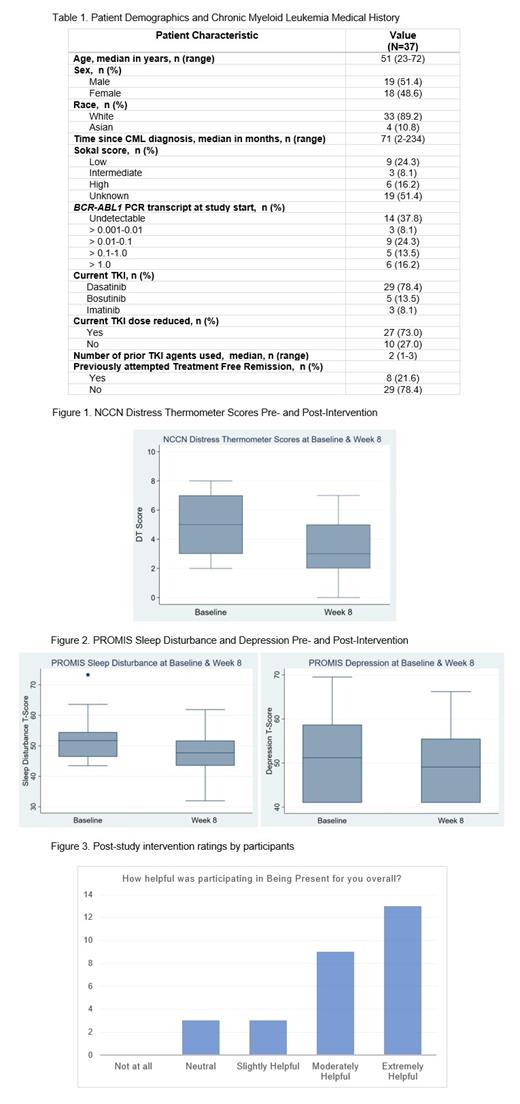Abstract
Background: Tyrosine kinase inhibitors (TKIs) enable patients with chronic phase chronic myeloid leukemia (CP-CML) to achieve similar overall survival to the general population, but can cause side effects that negatively impact quality of life (QOL) and contribute to distress. Since most CP-CML patients remain on TKIs indefinitely, there is a need to develop targeted interventions to address their physical and psychosocial complications. Mindfulness meditation interventions have improved QOL and decreased distress, depression, anxiety, fatigue, and pain in patients with solid tumors; however, such interventions have not previously been evaluated in patients with CP-CML. In Being Present-CML, we sought to determine if a mindfulness meditation-based program is feasible and acceptable to patients with CP-CML, and to explore its preliminary efficacy.
Methods: Being Present-CML is a prospective, single-arm clinical trial of an 8-week, online mindfulness meditation-based intervention effective in patients with gastrointestinal cancers (Atreya, et al. PLoS One, 2018). Participants were recruited from a single academic institution. Eligibility included adult patients with CP-CML taking TKIs. Participants were instructed to independently play audio-guided meditations at least 5 times per week on a secure website and to participate in once weekly, instructor-led meditation classes on Zoom in assigned cohorts. Qigong was incorporated into the classes to target fatigue, a common TKI side effect. Class content was recorded and uploaded to the website for those unable to attend live. Feasibility was assessed through measurement of recruitment and attrition. Adherence was determined by web capture. Acceptability was determined by feedback from study surveys and qualitative interviews. Preliminary efficacy was evaluated using patient-reported outcome measures (PROMs) at baseline (week 0) and post-intervention (week 8) using the NCCN Distress Thermometer (DT) and Patient-Reported Outcomes Measurement Information System (PROMIS) short forms for anxiety, depression, fatigue, pain interference, and sleep disturbance. A DT score ≥4 is consistent with moderate to severe distress. PROMIS scores use T-scores where the mean score for the general population is 50 (standard deviation [SD] +/-10); higher scores indicate worse symptoms. Descriptive statistics and two-tailed paired t-tests (p <0.05) were used to summarize the data.
Results: Between October 2020-April 2021, 98 eligible participants were approached to participate in the study; 88 (89.8%) patients agreed to learn more, and 37 (37.8%) patients provided consent. The median age was 51 (range 23-72), 51.5% (n=19/37) were male, and 89.1% (n=33/37) were non-Hispanic White. At time of study start, 83.7% (n=31/37) had a BCR-ABL1 PCR transcript ≤1% and a median time since diagnosis of 71 months (range 2-234) (Table 1). Of 37 participants, 29 (78.4%) completed end of study procedures; 4 (10.8%) dropped out, and 4 (10.8%) did not complete week 8 surveys. The median number of audio meditations listened to per participant was 34 with an average of 4.3 per week. The median number of weekly classes attended and/or recordings viewed per participant was 7 (range 1-8).
At baseline, participants had a median DT score of 5 (range 2-8). Average baseline PROMIS scores were slightly worse than the general population in depression (51.4, SD 8.8), anxiety (55.9, SD 7.8), sleep disturbance (51.8, SD 6.9), fatigue (53.9, SD 10.6), and pain interference (52.2, SD 9.9). By week 8, the median DT score improved to 3 (p=0.003) (Figure 1). Post-study PROMIS scores improved in sleep disturbance (p=0.001) and depression (p=0.01) (Figure 2), but not anxiety (p=0.12), fatigue (p=0.10), or pain interference (p=0.98). Of those who conducted post-study interviews, 77% (n=20/26) reported their symptoms during the study were not influenced by the COVID-19 pandemic. Nearly all participants found the study helpful (Figure 3) and would recommend it to others (median score of 8 on a 1-10 scale; 10=extremely likely).
Conclusions: Patients with CP-CML taking TKIs found the mindfulness meditation-based intervention to be feasible and acceptable. PROM results suggest promise of clinical benefit in this patient population, including patients with well-controlled disease and a long history of CML. A randomized controlled trial is being planned to validate these findings.
Smith: Astellas Pharma: Consultancy, Research Funding; FUJIFILM: Research Funding; Daiichi Sankyo: Consultancy; Revolutions Medicine: Research Funding; AbbVie: Research Funding; Amgen: Honoraria. Shah: Bristol-Myers Squibb: Research Funding. Atreya: Guardant Health: Research Funding; Pionyr Immunotherapeutics: Membership on an entity's Board of Directors or advisory committees; Array Biopharma: Membership on an entity's Board of Directors or advisory committees; Merck: Research Funding; Bristol-Meyers Squibb: Research Funding; Gossamer Bio: Research Funding; Novartis: Research Funding.


